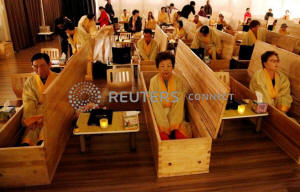Dying for a better life: South Koreans fake their funerals for life
lessons
 Send a link to a friend
Send a link to a friend
 [November 06, 2019]
By Daewoung Kim and Youngseo Choi [November 06, 2019]
By Daewoung Kim and Youngseo Choi
SEOUL (Reuters) - A South Korean service is
offering free funerals - but only to the living.
More than 25,000 people have participated in mass "living funeral"
services at Hyowon Healing Center since it opened in 2012, hoping to
improve their lives by simulating their deaths.
"Once you become conscious of death, and experience it, you undertake a
new approach to life," said 75-year-old Cho Jae-hee, who participated in
a recent living funeral as part of a "dying well" program offered by her
senior welfare center.
Dozens took part in the event, from teenagers to retirees, donning
shrouds, taking funeral portraits, penning their last testaments, and
lying in a closed coffin for around 10 minutes.
University student Choi Jin-kyu said his time in the coffin helped him
realize that too often, he viewed others as competitors.

"When I was in the coffin, I wondered what use that is," said the
28-year-old, adding that he plans to start his own business after
graduation rather than attempting to enter a highly-competitive job
market.
South Korea ranks 33 out of 40 countries surveyed in the Organisation
for Economic Co-operation and Development's Better Life Index. Many
younger South Koreans have high hopes for education and employment,
which have been dashed by a cooling economy and rising joblessness.
"It is important to learn and prepare for death even at a young age,"
said Professor Yu Eun-sil, a doctor at Asan Medical Center's pathology
department, who has written a book about death.
In 2016, South Korea's suicide rate was 20.2 per 100,000 residents,
almost double the global average of 10.53, according to the World Health
Organization.
[to top of second column]
|

Participants sit inside coffins during a "living funeral" event as
part of a "dying well" programme, in Seoul, South Korea, October 31,
2019. REUTERS/Heo Ran

Funeral company Hyowon began offering the living funerals to help
people appreciate their lives, and seek forgiveness and
reconciliation with family and friends, said Jeong Yong-mun, who
heads the healing center.
Jeong said he is heartened when people reconcile at a relative's
funeral, but is saddened they wait that long.
"We don't have forever," he said. "That's why I think this
experience is so important - we can apologize and reconcile sooner
and live the rest of our lives happily."
Occasionally he has dissuaded those contemplating suicide.
"I picked out those people who have asked themselves whether ...
they can actually commit suicide, and I reversed their decision,"
Jeong said.
The message of personal value resounded with Choi.
"I want to let people know that they matter, and that someone else
would be so sad if they were gone," he said, wiping away tears.
"Happiness is in the present."
(Reporting by Daewoung Kim and Youngseo Choi. Writing by Minwoo
Park. Editing by Josh Smith and Karishma Singh)
[© 2019 Thomson Reuters. All rights
reserved.]
Copyright 2019 Reuters. All rights reserved. This material may not be published,
broadcast, rewritten or redistributed.
Thompson Reuters is solely responsible for this content.
 |